Jul 2008
Jul 2008 sadmin2010 PROGRESS
2010 PROGRESS sadmin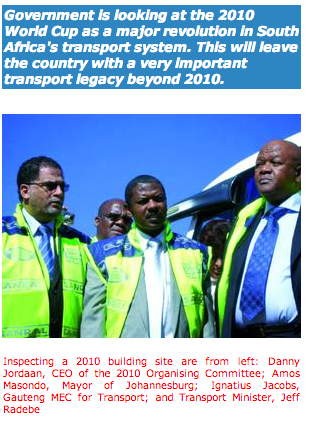
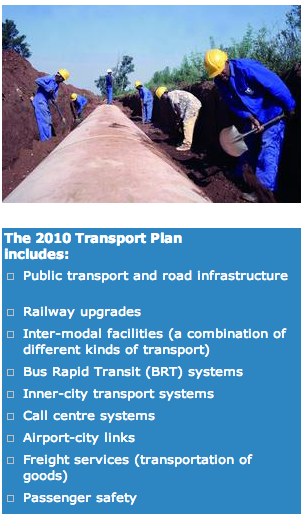
Advice: Prostate cancer - be aware, get tested
Advice: Prostate cancer - be aware, get tested sadmin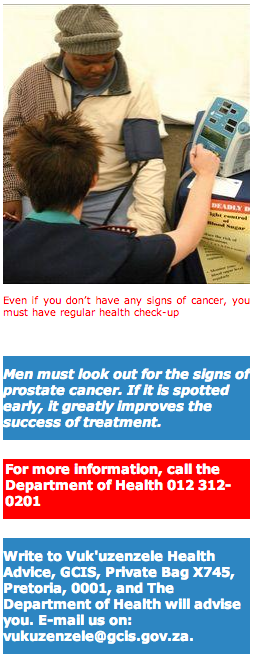
BUILDING A SAFER SOUTH AFRICA
BUILDING A SAFER SOUTH AFRICA sadminTAKE CHARGE, CRIME STOPS WITH ME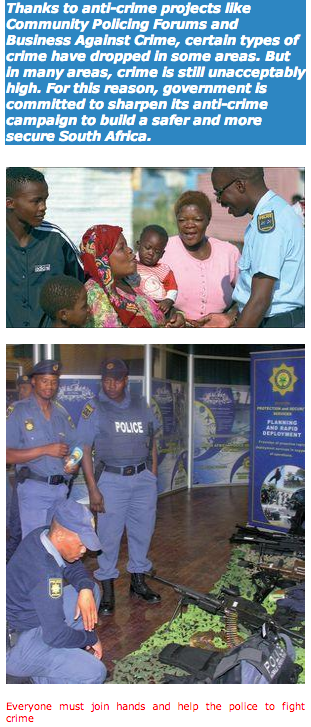
The high level of crime affects everyone in South Africa. It is not only the victims of crime who suffer, but also the good name of our country. This is why everyone, from individuals and communities to businesses, must join hands to fight crime.
Partnerships
Government's anti-crime campaign wants all sectors of society to form partnerships with government and law enforcement agencies to help make our country safer.
Many partnerships have already been formed. These include the Anti-Crime Leadership Forum, Business Against Crime, Take Charge, Bambanani, and Primedia Crime Stop.
Ordinary people
Ordinary people are encouraged to join the fight against crime by joining Community Police Forums, becoming police reservists, starting neighbourhood or street committees, or working as volunteers at their local police stations.
Members of the public are also encouraged to report crime at all times and to avoid buying stolen goods. Remember, if you buy stolen goods, you help to create a market for such goods.
Active citizens
As part of the anti-crime campaign, government also talks to different organisations about ways to keep our communities safe. Many of these organisations have already joined the fight against crime. They include Community Police Forums, faith-based organisations, organised labour and non-governmental organisations.
The International Marketing Council, for example, plans to start an Active Citizen campaign. The campaign will encourage citizens to stand together, to reach out and strengthen good values in our society.
Take charge
Last year, the Gauteng provincial Department of Community Safety started a crime prevention plan called Take Charge. The plan includes programmes like strengthening communitypolicing structures throughout the province.
The plan also aims to teach the public how their partnership with the police can help reduce crime. It aims to unite all communities from all backgrounds across Gauteng to help fight crime in their areas.
The theme for the campaign is "Take charge, because crime stops with me." If everyone in the country follows this advice, we can all help to stop crime and build a safer and more secure South Africa.
- Louise van Niekerk
BUILDING INDUSTRY: WOMEN STEP IN
BUILDING INDUSTRY: WOMEN STEP IN sadminBUILDING INDUSTRY: WOMEN STEP IN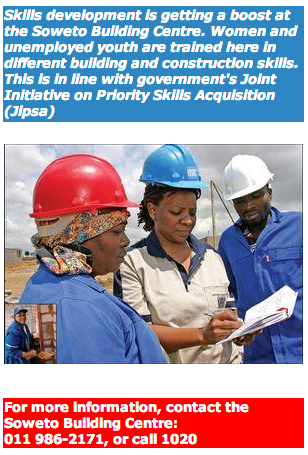
The Soweto Building Centre, supported by the Department of Labour, was started in 1991 to help people whose schooling was badly affected by the violence of the 1990s.
Today, the centre is helping to reduce the skills shortage in the building industry thanks to ongoing support from the department.
Women
Half of the students at the centre are women. Centre Manager, Simon Max Mohale, said a lot of women are showing interest and doing well in the field of building and construction. He said in the past, building construction was seen as a man's job. But thanks to more training opportunities for women, more and more women are joining the building business.
The centre is also training 50 members from ten co-operatives that are sponsored by the Department of Labour.
Grants
Students at the centre get training in skills like bricklaying, carpentry, tiling, painting and plumbing for a maximum period of 60 days.
The Department of Labour pays the grants per student directly to the centre. The amounts differ from about R7 000 to R11 400 depending on the student's trade. For example, plumbing students get more money than bricklaying students, because plumbing is a more expensive course.
Practical
A major part of the training is practical, but students also attend lessons in the classroom. Mohale said the centre gets advice from construction companies on what kind of specific training is needed in the building industry. This ensures that students who complete the courses are ready to start working as productive members of a building team.
On completion of the course, students get certificates that are recognised by the Construction Education and Training Authority (CETA).
Doing well
Mohale is very happy that many of their students are doing well in the building industry. "Everywhere I go, especially around Soweto where construction is taking place, I see students who received training from us. I don't remember all of them, but they greet me on the sites," he said. After completing the course, some of the students decide to get further training to become training officers.
Mohale believes that former students are making a major contribution to reduce the problem with housing backlogs in the province.
- Muzi Mkhwanazi
Keep the freezer compartment of your fridge closed to prevent cold air from escaping
EPWP IN ACTION
EPWP IN ACTION sadminHE GOT THE SKILLS THEN LED HIS HEART TO SUCCESS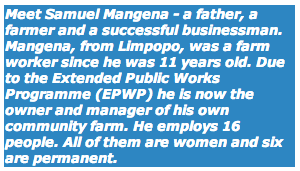
In 1989 Samuel Mangena left a good job at ZZ2 Tomatoes. After working there for 15 years, he realised that he had learned enough about the business of farming to go it alone.
He had experience of fertilisers, pesticides, irrigation machinery and disease control. He even had the ability to know the grades of tomatoes by just looking at them. "It was time for me to leave and follow my heart", said Mangena.
Local government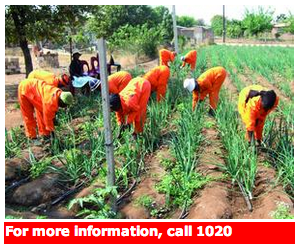
Armed with his knowledge of farming and his passion to make a difference, Mangena talked to the local chief and local government near Phalaborwa for help. They gave him a barren piece of land that was once a road. Using nothing more than a pick-axe and a fork, he managed to turn this dry land into a vegetable farm. He often worked right into the night with less than four hours of sleep.
EPWP
Now known as the Mangena Community Farm, it has since been built up to a two-hectare business venture. Products range from tomatoes, onions, spinach, cabbage, butternut, carrots and other vegetables. All of this would not have been possible without the help of the EPWP, through the Limpopo Department of Agriculture and the Phalaborwa Municipality. They have helped the Mangena Community Farm with a business plan, as well as an irrigation system.
"I now sell my vegetables to businesses around Phalaborwa including hotels, cafés and big shops like Pick & Pay and Spar". To keep costs down, Mangena doesn't deliver, but phones to tell them when the vegetables are ready to be collected. "I also supply a lot of produce to wholesalers. A crate of tomatoes I sell for R80 to retailers goes for only R60 to wholesalers," he said.
Women
Mangena's workers are all women. "Women are productive, easy to mentor and make better farmers," he said.
Mangena helps the community by sometimes donating his produce to poor households. He also helps learners from local schools with farming lessons on his plot. He is now working on a project to pump water after finding a borehole line where two underground rivers meet. Because the borehole is close to the school, it will benefit both the school and the community.
- Lucky Mochalibane
FIGHTING CRIME
FIGHTING CRIME sadminSAY NO TO MOB JUSTICE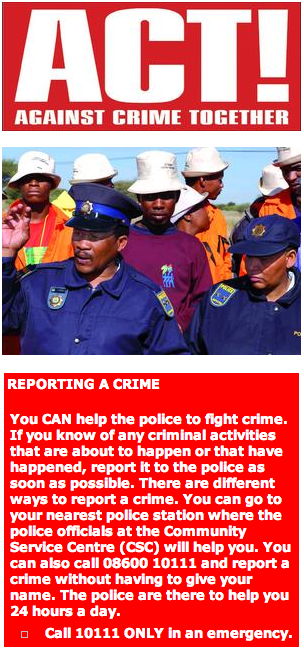
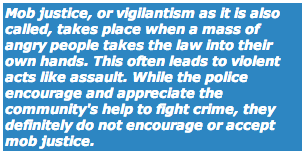
You may have seen it on television, read about it, heard it on radio or even seen it in your own community. A crowd of very angry people would beat up a person who is suspected of committing a crime. The crowd would use anything from their bare hands to shamboks, sticks, and even stones. 'We want to teach him a lesson', they would say.
Vigilantism
Mob justice is also called "vigilantism." It means taking the law into one's own hands. A person is a vigilante if he or she is a member of a group trying to enforce the law without the right to do so.
South Africa is a democratic country where everybody's rights are guaranteed in the Constitution. This country also has law enforcement agencies to perform these functions.
Acts of mob violence could lead to the mob committing other crimes like assault, public violence, intimidation and even murder. Committing these crimes could lead to imprisonment and/or a fine. No matter how angry you are, you must not take the law into your own hands. Let the police and the courts of law deal with the suspect.
Other choices
There are other ways of joining the fight against crime. One of them is to join the Community Police Forums (CPF). The CPFs is an opportunity for communities to work in partnership with the South African Police Service (SAPS). The partnership leads to better communication. While working together with the police, it becomes easier to see where the problems are and find solutions.
You can also become a police reservist. A police reservist is a member of the community who volunteers his or her service to help with policing functions for the SAPS. They do not get paid for their services but they have similar powers as permanent police officials. Phansi nge vigilantism Phansi! (Stop vigilantism, stop it!)
- Capt Tshifhiwa Tshikhudo, SAP
FIGHTING POVERTY
FIGHTING POVERTY sadminHELPING THE POOR TO HELP THEMSELVES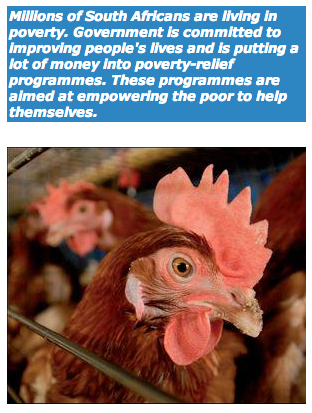
The Department of Social Development, through its agency called the National Development Agency, has started a number of projects to fight poverty. Among them are three projects in the Free State, which received a total of R1,8 million.
The money is used to start or improve farming projects that not only help people to improve their lives, but also benefit the communities as a whole.
Dairy farm
The Rouxville Legal and Community Advice Centre was started as a place where people from the community could get legal advice. It also helped victims of unfair labour practices on farms in the area.
Recently, the centre also became the heart of a farming project.
Many people in the area are poor and struggling to meet their families' basic needs. To help reduce poverty in the area, the National Development Agency gave the centre R470 000 to start a dairy farm project.
The project will create jobs and supply the local community and businesses with fresh and cheap milk.
Vegetables
Another project that got funds from the National Development Agency is the Mantsopa Mother's Trust.
The trust got R758 000 to further government's Joint Initiative for Priority Skills Acquisition (Jipsa). It will teach people skills like good governance, managing money and farming.
The money will also be used to start a hydroponic farming project. Hydroponic farming is a method of growing vegetables in water that is enriched with nutrients, instead of in soil. Equipment needed to keep the project going include special tunnels, cold rooms for storing vegetables, nutrients, chemicals and seedlings.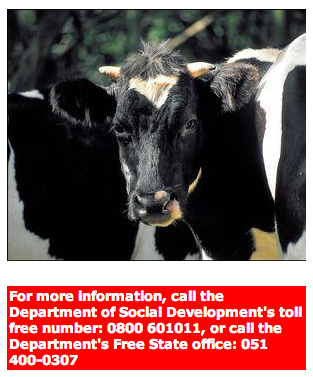
Poultry
The Itsoseng Basadi Poultry project is run by 15 women. The project got R615 000 to repair and build chicken houses, and to buy poultry-farming tools, laying hens and feed.
It will help the farm to grow and improve its productivity.
The new buildings, for example, will have room for 5 000 laying hens instead of only 500. This will help the women to make a profit from their farming instead of just surviving.
- Muzi Mkhwanazi
FOOD PRICE HIKE
FOOD PRICE HIKE sadmin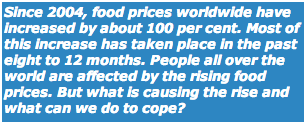 WHY FOOD PRICES ARE RISING AND HOW TO COPE
WHY FOOD PRICES ARE RISING AND HOW TO COPE
South Africa is not the only country facing high food prices. Many other countries in Africa, as well as in the rest of the world, are also experien-cing rising food prices.
One of the reasons why food prices are rising is because there is a greater need for food worldwide. In developing countries, for example, people are earning more money to buy food. This leaves too little to go around for everyone.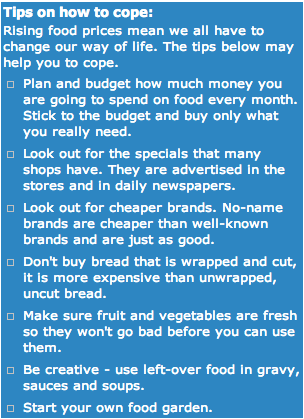
Climate change
Climate change also contributes to the rise in food prices. Bad weather conditions like droughts and extreme heat, floods, and frost during the past months have caused food crops to fail.
The rise in the oil price also plays a role. Rising oil prices cause the cost of fertilisers and food transport costs to go up.
Biofuels
Another reason why there is less food to go around in the world, is that in some countries farmers sell their crops to the producers of biofuels. This does not happen in South Africa. It does happen in places like the United States of America, China and Europe,
It means that the land on some farms that was used to plant food, is now used to produce fuel, and food that used to be eaten is changed into fuel.
- - Muzi Mkhwanazi
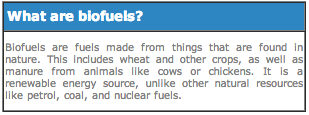
Remember to switch off lights during the day
HELP FOR HOUSEHOLDS IN DISTRESS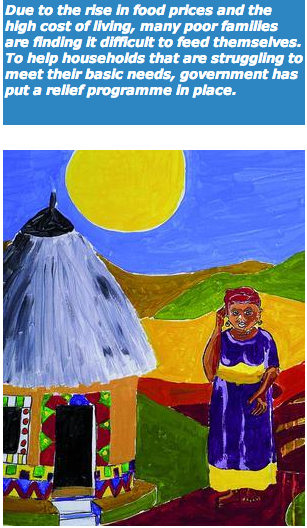
Government's Social Relief of Distress programme is helping people who are so poor that they cannot meet their families' most basic needs. To put this programme in place, government has given an amount of R124 million to the South African Social Security Agency (SASSA) and provincial departments of social development.
Who qualifies?
People only qualify for the programme if the family is in a crisis situation. The crisis could be due to one of the following reasons:
- You need help while you wait for child grants to be processed by government.
- You are affected by a disaster, like your house being flooded or burning down.
- You do not qualify for a social grant, but you are in a desperate situation due to things like unemployment.
- You are unable to work because you are medically unfit, meaning you are sick for less than six months;
- You are unable to get maintenance for your child or children from the child's other parent.
- The breadwinner in the family has died;
- The breadwinner has been sent to prison for a short time, less than six months; or
- You have been affected by a disaster, but the area or community in which you live has not been declared a disaster area.
The help may come in the form of food parcels or vouchers to buy food. But some provinces may give cash.
Social Relief of Distress is given for a short period of time only, usually for up to three months and sometimes for six months.
How to apply
To get help from this programme, you can apply at your nearest Social Security Office.
You must have the 13-digit bar-coded ID and children's birth certificates.
You must be able to prove that you have applied for a grant, had an emergency, tried to get maintenance, have no other support, your marital status, and that you have no income, or have a short-term medical disability.
If you do not have an identity document and birth certificates, a sworn statement from your local police station, chief, councillor or religious leader may be enough proof.
Once an application is submitted, the applicant's real need for the service will be considered, as well as the credibility of the application.

Extended
Applicants will get their first month's food parcel, voucher or cash even if they do not have all the necessary documents. But all documents must be submitted to the officer before the second month's payment is due.
If you do not submit all the documents, you may not get your second and third month's food parcel, voucher or cash.
The relief programme is only given for three moths, but if there is no change in your situation after getting the grant for three months, you may apply to have the grant extended for a further three months.
- Gabi Khumalo, BuaNews
Switch off heaters and lights when you leave the house
BEATING THE HIGH COST OF LIVING
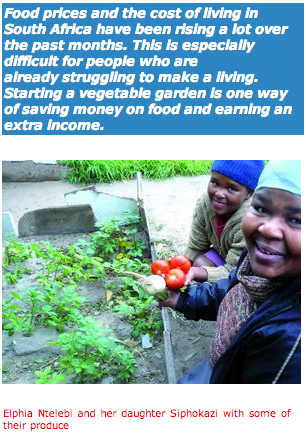
Government's Social Relief of Distress programme is helping people who are so poor that they cannot meet their families' most basic needs. To put this programme in place, government has given an amount of R124 million to the South African Social Security Agency (SASSA) and provincial departments of social development.
A WIN-WIN SOLUTION
Tlphia Ntelebi from Philippi Park informal settlement in the Cape is the only breadwinner in their household. Her husband is ill and cannot work and she is the mother of two boys and a girl.
Ntelebi is a domestic worker for different people and is also completing her matric. With all these responsibilities and a family to feed, her life is not easy. But instead of letting this get her down, she is doing something to beat the high cost of living.
Vegetables
To help save money on food, Ntelebi started a vegetable garden. "A bag of potatoes costs about R35 in the shops and by growing my own I save a lot of money," Ntelebi said. She said that potatoes grow quite quickly and can be used in many different ways. In summer they also plant mielies, watermelons and pumpkins.
Income
The produce from Ntelebi's garden doesn't only help her to feed her family, but also to earn some money. Any vegetables from the garden that are not used by the family are sold to people in the area at a low price.
This is win-win solution because other people also benefit. She says that they also exchange vegetables with people in the settlement who grow other vegeta
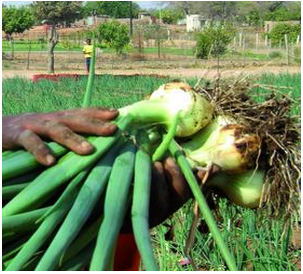
bles.
DON'T GIVE UP, BE CREATIVE
The Makeleni family lives in an informal settlement in Philippi in Cape Town. Noluthando, 26 and Nolukholo, 21, live with their brother and mother in a shack. All of them do their bit to help with the household expenses.
Noluthando works at a factory in Salt River where she presses clothing during the week. During weekends she works as a salesperson at a clothing store in Kenilworth.
Nolukholo stays at home where she is responsible for household chores and food. Their
mother works as a domestic worker and their brother is still in primary school.
Don't fill the kettle up when you boil water for only one cup of tea
Expenses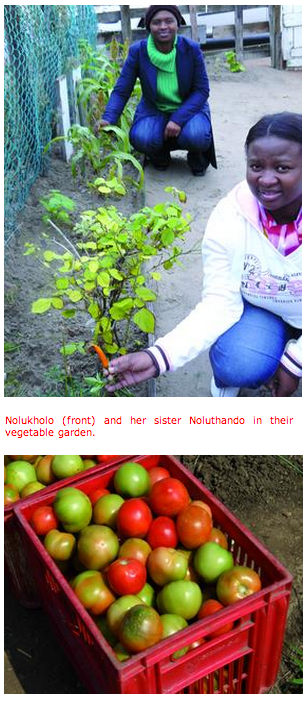
Noluthando said that all their contributions were not enough to cover their expenses. Like many other families, they are affected by the rising food prices. To help them survive, they started a vegetable garden.
They grow chillies, beans, sorghum and herbs. The herbs are used instead of medicine. Sorghum is very tasty and adds flavour to dishes, Noluthando said. They also use it to thicken bean dishes.
Basic Needs
"Since we have started growing vegetables, we don't have to buy so much food anymore," she said. "With the money we save we are able to buy bread and meet other basic needs."
The Makeleni family believes that with the ever-increasing cost of living, people have to be more creative to survive. That is why they have found ways to adapt instead of just giving up.
- Staff Reporter
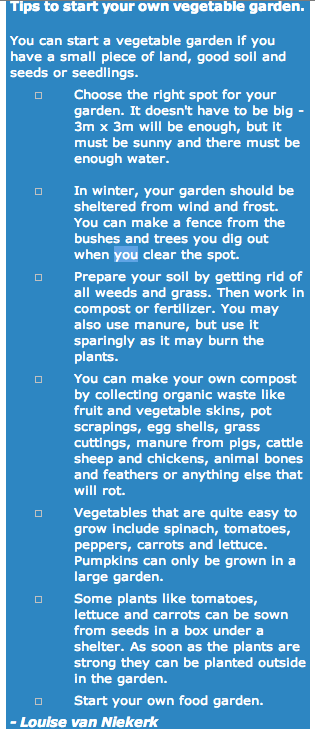

FOSTER CARE
FOSTER CARE sadminOPENING YOUR HEART AND HOME TO A FOSTER CHILD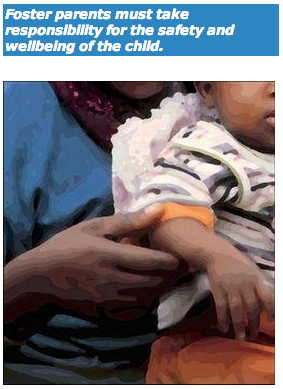
The Soweto bombings that shocked the country in 2002 left two children without parents. Mary and Joseph Mokoena had no one to look after them. Their mother's relatives were living in Lesotho and their stepfather left them immediately after their mother's death.
They were orphans without a family or a home. Thanks to a kind woman in Dube, Soweto, who opened her heart and home to them, they now have a foster parent who cares for them.
Grant
Foster care is a government service that helps children who do not have shelter or who cannot stay with their parents because of death, abuse or any other reason. Such children are put in the care of suitable people who are not the parents or guardians of the children. To help foster parents cope with the extra financial strain of raising children, government has a foster-care grant.
Children's court
The children's court, guided by the Child Care Act, identifies children who are in need of foster care. The court considers children who have been neglected and abandoned, or have been sexually or emotionally abused by their parents or guardian. They also look at children who are orphans or have parents or guardians who cannot be traced, children who cannot be controlled by their parents or guardians, or children who live on the streets.
Responsible
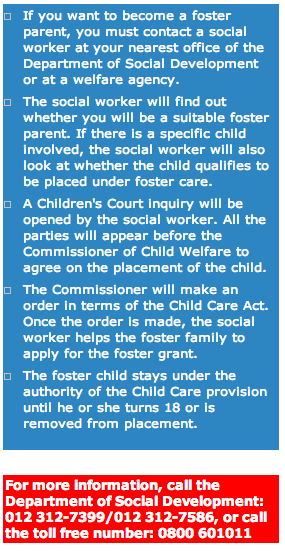
A person who wants to be a foster parent must be able to take responsibility for the safety and wellbeing of the child. They must be over 18 years old and must be willing to be assessed by a social worker to see whether they are
suitable.
- Muzi Mkhwanazi
KEEPING IT BRIEF
KEEPING IT BRIEF sadminKEEPING IT BRIEF
100TH THUSONG SERVICE CENTRE OPENED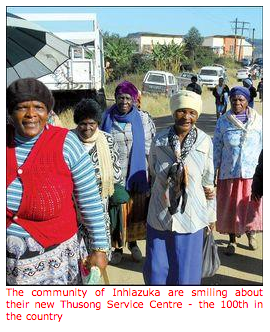
Gone are the days when the community of Inhlazuka in KwaZulu-Natal had to travel long distances to access government services. A new Thusong Service Centre - the 100th in the country - was opened at Inhlazuka by President Thabo Mbeki on 7 June.
The centre, which is the 15th in KwaZulu-Natal, offers services from government departments like Home Affairs, Social Development, Education and Labour. There is also a SA Social Security Agency, a post office, and a library. Communities will also get training in new skills like computer literacy and how to use the Internet. An Information Technology (IT) training course will be offered thanks to a partnership between local businesses, IT experts and the University of KwaZulu-Natal.
President Mbeki announced that government would build a further 20 service centres in the country this year. - BuaNews
- BuaNews
Limpopo
The Limpopo House of Traditional Leaders got 139 applications from traditional doctors to have initiation schools in the province. A total of 327 schools were registered in 2006; 43 of them were declared illegal. 40 314 young boys were initiated and at least 12 deaths were reported. In 2007, a total of 243 schools were registered and 32 300 boys were initiated. Seven illegal schools were reported and the number of deaths dropped to five.
- BuaNews
Mpumalanga
The province's Department of Housing built 12 320 low-cost houses last year. This is more than their target of
8 583 units. This year, they will build another 1 677 houses through the People's Housing Process at a cost of R721 million. The People's Housing Process encourages people to build their own homes by starting housing co-operatives. A further 500 houses will be built in the province through the Rural Housing Programme at a cost of R23 million.
- BuaNews
North West
Thanks to the Department of Land Affairs, the community of Bakwena-ba-Mogopa ba Bethani have recently returned to the land where they were born. They were removed from the land by the previous government. They are now encouraged and supported to use the land for farming since food production is the best way of fighting poverty and rising food prices.
- BuaNews
Eastern Cape
The Department of Home Affairs' campaign "ID Yourself" kicked off in Elliot in June. This means young people across the country can now start looking out for the Home Affairs mobile trucks which will be visiting their schools in the coming months. The campaign aims to raise awareness of the importance of having an ID document. It encourages young people, especially those in Grades 10 to 12 to apply for ID documents.
- BuaNews
Northern-Cape
In June, the province's Department of Agriculture and Land Affairs started a development programme encouraging youth to get involved in farming and rural development to help them get out of poverty. The programme, called Youth in Agriculture and Rural Development (YARD), aims to promote and improve the participation of youth in the farming sector. It will also start programmes to promote and develop t farming and rural development skills among the youth.
- BuaNews
Gauteng
The new Lufhereng Mixed Income Housing Development Project in Soweto will provide 25 000 houses to residents in the area. The project will include RDP houses for the poorest of the poor, affordable housing for other low-income households, as well as middle to high income housing. It is the biggest project ever to be undertaken by the Gauteng Department of Housing and the City of Johannesburg.
- BuaNews

Switch off lights and electrical appliances that you are not using when you leave a room
MANAGING YOUR MONEY
MANAGING YOUR MONEY sadmin
MOVEMENT FOR GOOD
MOVEMENT FOR GOOD sadmin… IT STARTS WITH YOU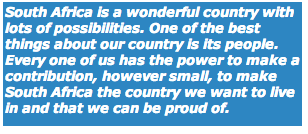
"Noka e tlatswa ke dinokana" is a Sesotho term meaning "A river swells from little streams." This is the motto of the Movement for Good, which is aimed at getting South Africans to help create the country they want to live in.
If everyone in the country does something small that is positive, it will swell like a river to become one big positive wave.
Active citizens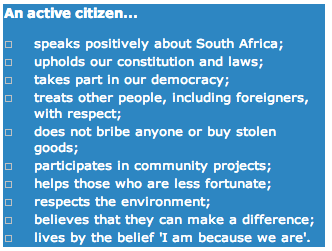
Making and keeping South Africa a wonderful country starts with YOU. To help you do this, a number of big organisations, like Government, the SABC, City Press, the International Marketing Council, and Heartlines have joined forces and are working together to involve ordinary South Africans to join the movement. The movement aims to connect and move people to become active citizens. This means they will help to make our country a place they will enjoy living in and which is free of xenophobia.
Doing good
Doing something good involves anything that is positive like helping those who are less fortunate; doing your bit to save energy; treating others with tolerance, dignity and respect; refusing to do crime, take bribes, or buy stolen goods; speaking out against violence and abuse; respecting the environment, and talking positively about South Africa.
Research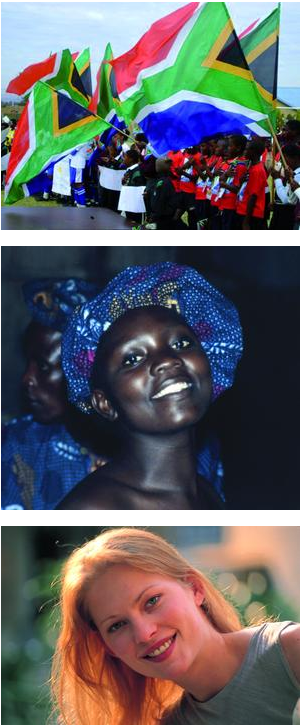
A research study found that South Africans were good people. It showed that 93 per cent of South Africans give to social causes in the form of donations, time, and goods.
It also showed that a total of R12 billion a year is donated by ordinary people for good causes all over the country. There are 100 000 non-governmental organisations that are working to make a difference and to do good in the country.
Share
People can get together and share their experiences using their cell phones or the Internet. Those using their cell phones will be forwarded weekly sms messages giving positive and practical information on how to take positive action.
The network will also connect active citizens from the same areas who want to get involved in similar activities.
To register on the For Good Network, visit www.forgood.co.za or sms 'good' to 32197.
- Muzi Mkhwanazi
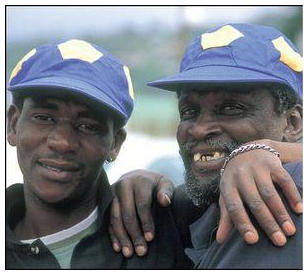
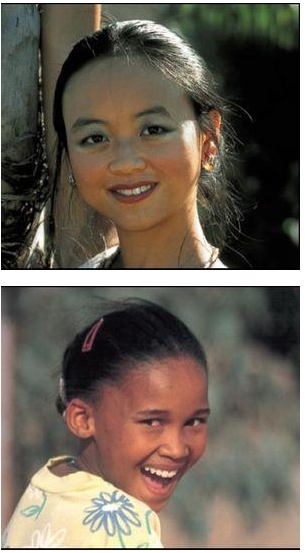
SCHOOLS WORLD CUP KICKS OFF
SCHOOLS WORLD CUP KICKS OFF sadminYOUTH
SCHOOLS WORLD CUP KICKS OFF
The Schools Football World Cup is a joint project by the Department of Education, the Department of Sport and Recreation, the 2010 Organising Committee (OC) and the SABC. It aims to educate and get some 12 million South African school pupils - both boys and girls - excited about the 2010 FIFA World Cup.
Two phases
The tournament will be rolled out in two phases. The first phase will be organised along the lines of the Confederations Cup and the second phase will be the actual World Cup.
For each of the phases, the schools that participate will play the role of the participating countries. All schools will be encouraged to fly the national flag, sing the national anthem and engage in other activities like preparing the national food of the country they represent.
Positive message
The project also aims to get school children away from the streets and bad habits, and encourage them to lead healthy lifestyles.
OC Chairman, Irvin Khoza, said the 12 million school children targeted by the project would help spread a positive message about the World Cup to families and communities.
District competitions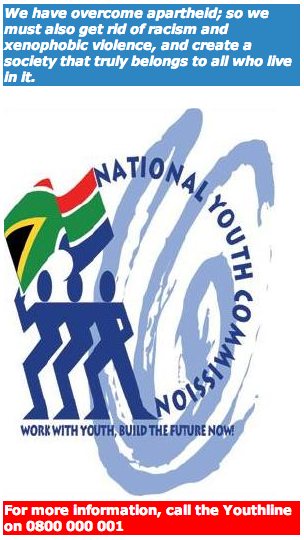
District competitions for the South African Schools Football World Cup will take place from 16 May to 16 August 2008. Provincial competitions will take place from 30 August to 14 September 2008 and finals from 20 to 23 March 2008.
- Simangaliso Zwane
YOUTH MUST UNITE AGAINST XENOPHOBIA
All young South Africans, irrespective of race, gender, ability, and nationality, must unite in the fight against attacks on people from other countries.
As our leaders of tomorrow, the youth are champions of the rights, security and welfare of all Africans. They must be committed to rid the country and the continent of racism, xenophobia and all hatred towards foreigners no matter which country they come from.
Key messages
These were among the key messages during Youth Development Month, which was celebrated in June. It is also the month in which we marked Youth Day on 16 June.
Skills
Another key message to the youth during this time, was to empower themselves by developing their skills. Some government programmes to help them improve their lives, include the National Youth Service Programme, the Umsobomvu Youth Fund, the Expanded Public Works Programme, the Community Development Workers Initiative, and Learnerships.
Fix dripping taps. In just one day, a dripping hot-water tap wastes enough water to fill a bath
SUKUMANI COMMUNITY EMPOWERMENT PROJECT
SUKUMANI COMMUNITY EMPOWERMENT PROJECT sadminGIVING MEANING TO MANY LIVES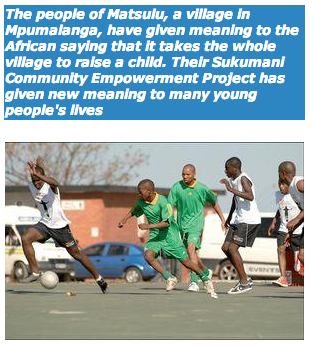
When the community of Matsulu saw that the youth in the area were getting involved in bad things like alcohol, teenage pregnancies, unprotected sex and crime, they decided to do something.
Meaningful projects
Matsulu is a small village in the mountains between Nelspruit and Malelane. It has a population of about 55 000 people. There are no big industries in the area and most of the people are farm workers. The lack of meaningful activities for the youth resulted in some of them doing bad things.
The Sukumani Community Empowerment Project was born when the community took the responsibility to create meaningful activities for the youth. The project is run by volunteers from one of the primary schools in the area.
They have started different projects to address the challenges that the youth in the area are facing. It has helped to bring a sense of pride and meaning to the lives of many young people.
Most of the youth who did crime, had passed their matric and had nothing to keep them busy. So, the organisation asked a number of tertiary institutions like colleges and universities to come to the area and give advice about careers.
Careers
Now, a number of institutions visit the area every year and help matriculants to choose careers. The project is already helping ten of the learners to get bursaries for further studies.
They are also working with schools in the area to help with teacher training and development in science and maths. They have organised workshops run by experts in the fields of science.
The teacher development plan is part of government's Joint Initiative for Priority Skills Acquisition programme (Jipsa).
Workshops
The teacher development workshops are very popular events and there is a great need for them. The project also organises sporting, drama and camping activities for the youth in the area.
The whole community gets involved in the activities. A lot of people come to support their children and everyone in the area looks forward to the events. On such days some people also get the opportunity to make money by selling their goods.
Proud
The project is planning to build a park with netball, volleyball and soccer grounds. So, instead of the youth drinking, they will be helping to clear the ground and building a park to make the whole community proud.
- Muzi Mkhwanazi
Turn off your computer when you are not using it
VUKANI-UBUNTU JEWELLERY PROJECTS
VUKANI-UBUNTU JEWELLERY PROJECTS sadminHELPING RURAL COMMUNITIES TO SHINE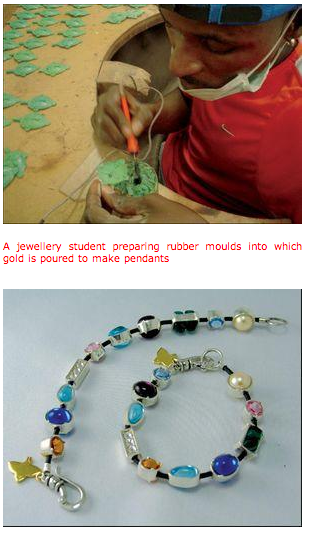
Fashion lovers in overseas countries are shining with jewellery made by some of South Africa's rural and historically disadvantaged communities.
Thanks to the Vukani-Ubuntu Community Development Programme, the jewellers from these communities are also shining brightly through their work.
By empowering disadvantaged communities through training and skills development projects, Vukani-Ubuntu is helping government reach its goals of developing scarce skills, fighting poverty and supporting small business development.
Sponsorship
Community development champion, Demos Takoulas, started the project. Takoulas, who runs Academy International, a computer and business training college, saw the need for jewellery schools in previously disadvantaged areas. Through the Academy's Outreach Programme, he got a R240 000 sponsorship from the Anglo Gold Ashante mine. It helped him to start a jewellery school in Atteridgeville, near Pretoria in 1999.
Today, there are eight Vukani-Ubuntu jewellery projects. They are situated in Mpumalanga, Gauteng, the Free State and the Northern Cape. All the projects are owned by the communities with Vukani-Ubuntu only helping to run and market the businesses.
Co-operation
Together with five other community-based jewellery projects in the country, Vukani-Ubuntu has formed a co-operation that sells their jewellery to countries like Canada, Japan and America.
Takoulas said the Department of Trade and Industry, through its Black Business Supplier Development Programme, sponsors them when they take the products to trade shows, conferences and seminars in South Africa and overseas.
High standards

He said their students are trained to meet the high standards demanded by jewellery buyers overseas.
Jewellery design is a three-year course and costs about R40 000 per year per student. The Mining and Qualification Authority SETA sponsors half the money for each student, while organisations like the Nelson Mandela Children's Fund and the National Development Agency also help with funding.
One of the most successful projects is the Umjindi Jewellery project in Barberton, Mpumalanga. It has already created hundreds of jobs in the area.
- Ndivhuwo Khangale
XENOPHOBIA
XENOPHOBIA sadminFOREIGNERS ARE AS HUMAN AS WE ARE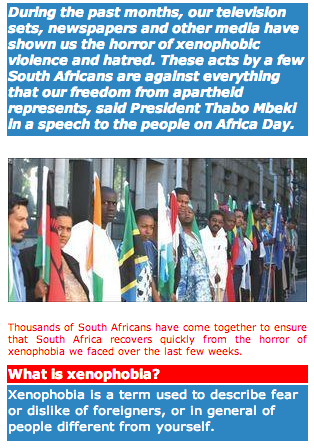
Xenophobia goes against all that has been done in this country to create a kind and caring society built on the values of ubuntu. These attacks are not in line with the values of our people.
We must remember that many people from other African countries have helped us to fight apartheid. They are as human as we are and deserve to be treated with respect and dignity. An injury to one, is an injury to all, President Mbeki said.
Horror
It is important to know that while the xenophobic violence was serious, it was limited to only a few areas in the country. In these areas, only small numbers of people committed the violent acts. Most South Africans are against xenophobia and reacted with horror to the attacks.
Support
As soon as the violence started, South African security agencies moved quickly to bring the violence to an end. Government also acted against the violence with the help of the South African National Defence Force.
In addition, they started helping victims with basic needs, in partnership with different civil society groups. Task teams have also been set up to organise support for victims of the violence.
Reaching out
Many South Africans all over the country are willing to fight xenophobia and have shown their support for the victims in different ways. People from all races are reaching out to them by giving blankets, food, clothing, money and shelter. Some have organised marches to show their support. Big businesses are also showing their support by donating money to help victims.
SA values foreigners
Government continues to work with international organisations like the United Nations, Doctors without Borders and some local non-government organisations. They help to ensure that temporary shelters set up for victims are in line with international standards.
Many of those who caused hurt to foreigners at the time were arrested and special courts set up to deal with them. South Africa values the contributions that foreigners make to grow and develop our country.